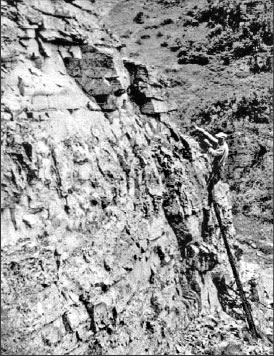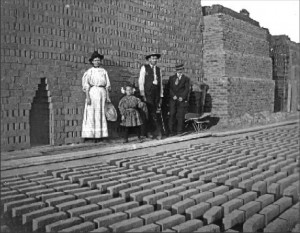by Ron Flannery
We were motoring up U. S. 50 in the canyon east of Cotopaxi, Colorado. As usual, my dad scanned things beyond the road itself. Suddenly, he said, “Yep, they’re still there.” Not seeing anything but the steep canyon wall on one side and the Arkansas River on the other, I asked, “What’s still there?”
“The spikes in the wall.”
“Huh, where, I don’t see…?”

He pulled over at the next wide spot. We got out and he pointed up the sheer stone wall. “See those steel pins sticking out about thirty feet up?” I nodded yes with a “So what?” look.
“We had no place to set poles. That stone wall had to be the support for the first telephone lines we brought up this way. Within that stone must be ghostly echoes of all those words people shared on that pair of copper wires.”
One more time my Dad had surprised and impressed me with a first-hand pioneering story. On the Ouray to Silverton Pass he had previously pointed out the remains of a first-time pole line made from spruce trees. The limbs had been hacked off, crossarms mounted on the remaining stumps and wire attached. There were miles of similar pole lines in other rugged terrain.
In addition to helping build those first strands of telephone service, my dad maintained those open wire circuits as a toll patrolman. Sometimes he walked a short distance from the truck to make repairs. Other times he snowshoed along wilderness routes on mountain passes to restore service. In honest jest, dad chuckled at the simple fact that folks “…only knew you were OK when you came out on the other side.”
Most of the copper wire has been salvaged. Interstate highways bypass those old roads paralleled with poles. Now camouflaged radio towers and satellites transmit broad channels of traffic. The canyon highway has been widened and the pins that carried those circuits are now only phantoms. But deep in the stone are the voices.
Originally published in the THEMA Literary Journal.
Ron Flannery is a Colorado native. His nostalgic stories cover growing up in the Wild West.

